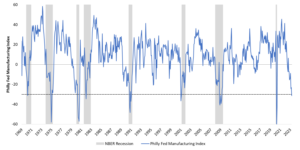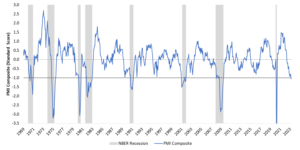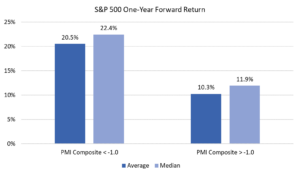More and more evidence is now pointing to the much-anticipated recession beginning to materialize over the next few months. Last Thursday, the Philadelphia Fed released its Philly Fed Manufacturing Index, a survey which measures changes in manufacturing activity covering the Pennsylvania, New Jersey, and Delaware region. While this is only one of many so-called regional PMIs, or surveys of manufacturing activity compiled by regional Fed banks, it is perhaps the most widely followed. That’s because it is one of the earliest to come out each month, and also because historically, it has done a very good job of anticipating turns in the economy as a whole. For the month of April, the Philly Fed Manufacturing Index fell to a level of -31.3. As the chart below shows, since its first publication in 1968, the index has never fallen below -30 without the economy already being in a recession or about to be in one.

Source: Congress Wealth Management, Bloomberg, NBER, as of 4/24/2023
The Philly Fed Manufacturing Index is not the only gauge of business activity that is currently flashing a recessionary signal. Our proprietary PMI composite indicator combines the messages coming from several regional Fed surveys (Philadelphia, New York, Dallas, Richmond, Kansas City, Milwaukee, and Chicago) with the one coming from the national surveys (compiled by the Institute for Supply Management or ISM) into a single, standard score. As shown in the chart below, that score has now fallen below -1, which has always coincided with or led to recession.

Source: Congress Wealth Management, National Bureau of Economic Research, Bloomberg, as of 3/8/2023
So, a recession is fast approaching. Does that mean it’s time to sell stocks? Historically, that would not have been a good call. Since 1968, whenever the score of our PMI composite was below -1, one-year forward returns on the S&P 500 index have been roughly twice as large as when the score was above -1. That is because by this point, the stock market has usually already figured out that a recession is coming and has largely discounted it. Similarly, stocks will start to anticipate and price in a recovery before it materializes, while the economy is still officially in recession. That is usually when new bull markets are born.
As the great Warren Buffet once said: “be greedy when others are fearful”. Sell stocks now at your own peril.

Source: Congress Wealth Management, National Bureau of Economic Research, Bloomberg, as of 3/8/2023
Sauro Locatelli CFA, FRM™, SCR™
Director of Quantitative Research
Congress Wealth Management LLC (“Congress”) is a registered investment advisor with the U.S. Securities and Exchange Commission (“SEC”). Registration does not imply a certain level of skill or training. For additional information, please visit our website at congresswealth.com or visit the Investment Adviser Public Disclosure website at www.adviserinfo.sec.gov by searching with Congress’ CRD #310873.
This note is provided for informational purposes only. Congress believes this information to be accurate and reliable but does not warrant it as to completeness or accuracy. This note may include candid statements, opinions and/or forecasts, including those regarding investment strategies and economic and market conditions; however, there is no guarantee that such statements, opinions and/or forecasts will prove to be correct. All such expressions of opinions or forecasts are subject to change without notice. Any projections, targets or estimates are forward looking statements and are based on Congress’ research, analysis, and assumption. Due to rapidly changing market conditions and the complexity of investment decisions, supplemental information and other sources may be required to make informed investment decisions based on your individual investment objectives and suitability specifications. This note is not a complete analysis of all material facts respecting any issuer, industry or security or of your investment objectives, parameters, needs or financial situation, and therefore is not a sufficient basis alone on which to base an investment decision. Clients should seek financial advice regarding the appropriateness of investing in any security or investment strategy discussed or recommended in this note. No portion of this note is to be construed as a solicitation to buy or sell a security or the provision of personalized investment, tax or legal advice. Investing entails the risk of loss of principal.





Comments are closed.